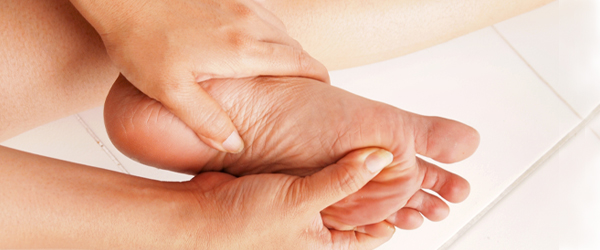Diabetes and the Importance of Foot Care

Diabetic foot problems are a major health concern. Nerve damage and poor circulation are two complications of diabetes, which are associated with many conditions that affect the feet and may require treatment. These include neuropathy and nerve compression, Charcot foot collapse, hammer toes, infections, and ulcers.
The lack of feeling and poor blood flow can allow a small blister or break in the skin to progress into a serious infection in a matter of days. Chronic nerve damage (neuropathy) can cause dry and cracked skin, which provides an opportunity for bacteria to enter and cause infection. The consequences can range from hospitalization for antibiotics to amputation of a toe or foot.
For people with diabetes, careful, daily inspection of the feet is essential to overall health and preventing damaging foot problems.
“The best treatment for diabetic foot and ankle disorders is prevention. Patients should watch their diet, take their medications as directed by their physicians or other health care professionals, and follow the diabetic foot care instructions listed below. When diabetic foot and ankle disorders occur, prompt evaluation by an orthopedic foot and ankle surgeon may allow for non-operative treatment or surgical treatment to decrease pain, improve function, or prevent further damage,” says Dr. Michael Aronow, Orthopedic Surgeon, Foot & Ankle Specialist.
Care for your feet
For people with diabetes, even a small cut can produce serious consequences. With reduced feeling in your feet, you may not notice a foreign object in your shoe or feel pressure from foot deformity, including bunions, hammer toes, and flat feet. As a result, you could develop a blister, cut, or ulcer. This could lead to an infection or a nonhealing wound that could put you at risk for an amputation.
To avoid serious foot problems that could result in losing a toe, foot, or leg, follow these guidelines.
Inspect your feet daily for cuts, blisters, redness, swelling, or nail problems. Use a magnifying hand mirror to look at the bottom of your feet. Call your doctor if you notice anything.
Bathe your feet in lukewarm water daily to keep them clean. Use only lukewarm water—the temperature you would use on a newborn baby. Check the temperature of the water with your elbow, not your foot. Be gentle by using a soft washcloth, and pat dry, be careful between your toes.
Moisturize your feet daily to keep dry skin from itching or cracking. Don’t moisturize between the toes—that could increase the risk of a fungal infection.
Wear clean, dry socks and change them daily. Always keep your feet warm and dry. Consider using an antiperspirant on the soles of your feet if you sweat excessively. Don’t let your feet get wet in snow or rain. Wear warm socks and shoes in the winter.
Consider wearing special diabetic socks that have extra cushioning, do not have elastic tops, are higher than the ankle, and are made from fibers that wick moisture away from the skin.
Shake out your shoes and feel the inside before wearing them because you may not be able to feel a pebble or other foreign object.
Never walk barefoot and always wear shoes or slippers, even at home. You could step on something and get a scratch or cut.
Seeing a podiatrist or orthopedic foot and ankle surgeon for periodic exams can help prevent foot complications from diabetes.
Why choose an orthopedic foot and ankle specialist?
Our board-certified orthopedic surgeon foot and ankle specialists at OAH have expertise in the non-operative and operative treatment of a wide range of foot and ankle disorders.
Their intensive education and training qualify them to perform a wide range of surgeries, including any surgery that may be needed to treat conditions for diabetic foot care that are non-responsive to non-operative care.
If you’re someone with diabetes experiencing the conditions above, don’t wait. Make the move to see one of our foot and ankle specialists today!